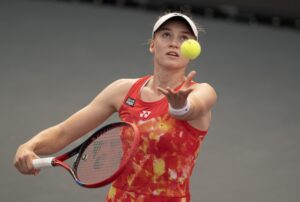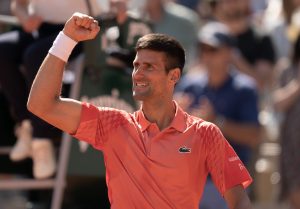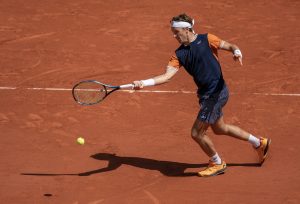The thing about complacency is that, by definition, you don’t know when you’re suffering from it. All sportsmen and women routinely claim before a big match or tournament that they are expected to win that they are not being complacent, but uttering this mantra offers no protection against taking a supposedly lesser opponent for granted. If it did, there would never be any sporting shocks or upsets.
Roger Federer must guard against complacency at Wimbledon, because he is now such an overwhelming favourite to win the tournament that even he might begin to believe the bookmakers and assume that he has one hand on the trophy for the men’s singles title. He was already the favourite before the tournament began, but after the exit this week of the other members of the “Big Four” (Nadal losing to Gilles Muller in a fourth round epic, and Murray and Djokovic succumbing to injury in the quarterfinals), he now stands alone as the only multiple Major winner left in the tournament.
Between them, the other three men competing in the men’s semifinals – Tomáš Berdych, Sam Querrey, and Marin Cilic – can boast only one Grand Slam win between them (Cilic’s US Open triumph in 2014) and one other appearance in a Major final (Berdych having made the Wimbledon final in 2010). Indeed, for Querrey this is his first ever appearance in the last four of a Slam. Consequently, Federer, who has won 18 Majors and appeared in 10 other finals, is regarded as a cast-iron certainty to triumph at Wimbledon again, which would make him the winningest Wimbledon champion ever with eight titles.
And yet winning when everybody expects you to is one of the hardest things to do in sport, which is why favourites – even overwhelming favourites – do not always win. One only has to look at Chelsea’s failure to win the FA Cup final (and with it the league and cup double) in May, when they were fancied to beat Arsenal by a minimum of two clear goals, to see that. When everyone else assumes that you will win, and win easily at that, it is only natural and all too human to begin to believe it yourself.
That is why Andy Murray’s Wimbledon triumph last year was in some ways as impressive as his historic first win in 2013. In 2013, he was the underdog, even in the final against Djokovic, and could play without the pressure of being regarded as the favourite. By complete contrast, when Djokovic crashed out of Wimbledon last year at the big-serving hands of Querrey, Murray had to endure almost a week of being regarded as the likely or even probable victor. That he withstood that pressure and claimed a second Wimbledon crown was a testament to his ability to ignore other people’s opinions and premature coronation of him as champion.
In the wake of his consummate display in the quarterfinal against Milos Raonic, which neatly avenged his semi-final loss to the same opponent last year, Federer was certainly making all the right noises, rightly maintaining that there was a long way to go and at least two matches before he could win Wimbledon again. For his sake, he hopefully believed everything that he was saying; if he didn’t he only had to look back at the US Open of 2014 for a reminder of what can happen when everyone expects you to win a semi-final and final easily.
That year in New York, Federer had already seen Djokovic crash out in the first semi-final to Kei Nishikori when he came to face Marin Cilic in the second. What followed was almost the definition of “taking the racket out of your opponent’s hand,” as Cilic produced simply stunning serving to defeat Federer in straight sets. Indeed, his power and accuracy of serve were so impressive that day, and again in the final when he beat Nishikori, that they deserved comparison with those of his then-coach, Goran Ivanisevic.
Nearly three years on, Cilic is second favourite to win Wimbledon 2017 and thus his second Major. Even without Ivanisevic in his corner, he has retained much of the deadly serving that he showed in the 2014 US Open and, perhaps crucially, he has spent far less time on court in the past fortnight than Querrey, who has endured several five-setters, including against Jo-Wilfried Tsonga and Andy Murray. The extra mileage that Querrey has put in compared to Cilic may ultimately cost him in the semi, just as it did Gilles Muller after his herculean efforts against Nadal.
Assuming that Federer beats Berdych (and after Berdych so surprisingly beat him at the Athens Olympics in 2004, Federer has won almost all of their subsequent matches, aside from a string of Berdych victories from 2010-2012), it is likely to be Cilic who he faces in the final. Surely Federer will remember that 2014 US Open thrashing at the hands of Cilic and guard himself against even a hint of complacency. If he does not, Cilic is more than capable of beating him. If, however, he does win his eighth Wimbledon title and 19th Major overall, surely it cannot be long before the famous Wimbledon postcode, which is surely the most famous post or zip code in the world, is changed from SW19 to RF19, if only temporarily. But there it is again – that invisible enemy, complacency, inviting thoughts of success before the hard work necessary to secure it. That, even more than Cilic, is surely the biggest obstacle that Federer faces at Wimbledon and if he does not overcome it there will be a new name on the famous Wimbledon trophy.






